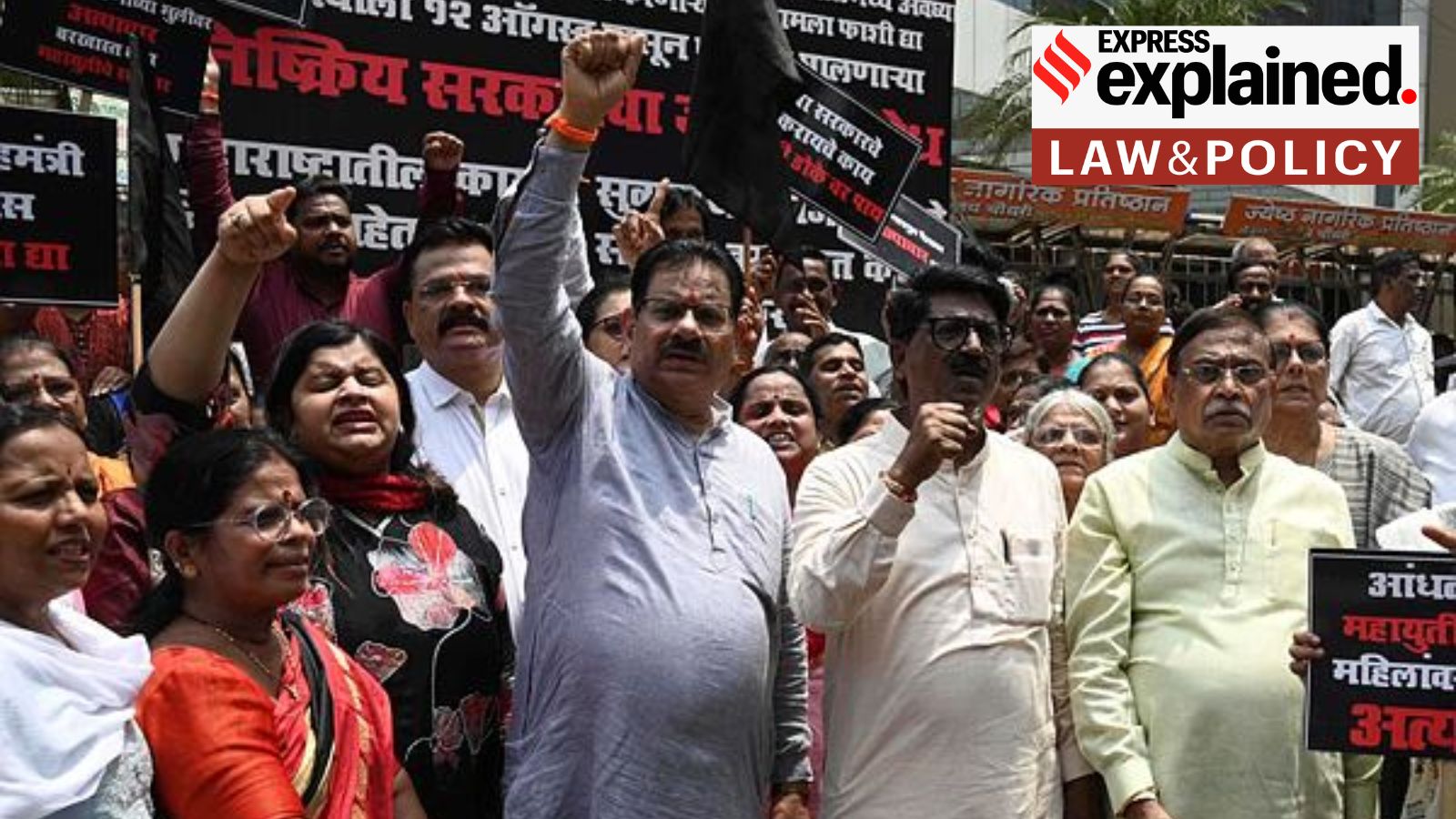The Maha Vikas Aghadi (MVA) alliance in Maharashtra withdrew its calls for a statewide ‘bandh’ on Saturday (August 24) to protest the alleged sexual assault against minors in Badlapur.
The decision followed a Bombay High Court order on Friday that said, “Until further orders, all concerned are restrained from proceeding with the call for bandh in the State of Maharashtra on 24th August 2024 or any other subsequent date”. The opposition MVA then staged a statewide silent protest.
Why did the high court call off the bandh? And why have courts refused to recognise bandhs as a valid expression of the right to protest in the past?
Why Bombay HC ordered against Maharashtra bandh
The bench of Chief Justice Devendra Kumar Upadhyaya and Justice Amit Borkar highlighted the impact that a bandh would have on the economy and public services after taking note of news reports saying “the local trains, buses and roads shall be closed.”
The court stated that a bandh was a “call for cessation of all kinds of activities” and that “it may lead to crippling the life of entire Maharashtra”. Referring to past Supreme Court and high court verdicts, it added that such a bandh would adversely impact emergency services and public conveniences.
The high court also provided its reasoning for passing this order without first hearing MVA in court, stating it was not possible to send notice and hear all the parties due to “paucity of time”. The bandh was to come into effect the day after the hearing.
Speaking with The Indian Express, Advocate Gautam Bhatia, a public law expert, criticised the court’s decision, stating, “It appears to me that the right to call for bandh is enshrined under Article 19 (1) (a) (right to freedom of speech and expression) of the Constitution and calling for bandh per se is not a violation of public order. In my opinion, it was not correct to restrain the political parties from calling Maharashtra bandh”.
Story continues below this ad
Bhatia also observed that the burden of maintaining public order should fall on the police rather than the courts, saying, “It is the state police’s job to address the issue and maintain law and order”.
Supreme Court on the right to protest
When dealing with cases concerning the right to protest in the past, the Supreme Court has traced it to Article 19(1) of the Constitution of India. Specifically, it has held that the right to freedom of speech and expression and to assemble peacefully without arms gives people the right to protest peacefully.
However, the court has often been tasked with balancing it with the “reasonable restriction” of maintaining public order under Article 19(2).
In 2011, the Supreme Court took suo motu cognisance of the Ramlila Maidan incident of June 4 that year. The police forcibly evicted sleeping protesters who supported Baba Ramdev’s hunger strike against corruption.
Story continues below this ad
The apex court condemned the imposition of Section 144 of the Criminal Procedure Code, which allows a Magistrate to issue an order directing persons to “abstain from a certain act” to prevent, among other things, “disturbance of the public tranquillity, or a riot, or an affray”.
The SC also issued guidelines saying that seeking police permission to conduct protests “would squarely fall within the regulatory mechanism of reasonable restrictions, contemplated under Articles 19(2) and 19(3)”. It held that Section 144 should only be imposed when the facts show a need to maintain public order, and the police should act in a manner which causes the “least invasion” of the rights of protestors.
In 2020, protests against the Citizenship Amendment Act resulted in a road closure in New Delhi. The court then held, “However, while appreciating the existence of the right to peaceful protest against a legislation… we have to make it unequivocally clear that public ways and public spaces cannot be occupied in such a manner and that too indefinitely”.
The difference between a ‘bandh’ and other protests
While courts have established guidelines for the right to protest, a more hardline stance has been adopted on ‘bandhs’.
Story continues below this ad
In July 1997, the Kerala High Court defined a ‘bandh’, stating “When the organisers call for a bandh, they clearly express their intention that they expect all activities to come to a standstill on the day of the bundh…”
The court said this is often accompanied by a “concerned person being threatened with consequences…if he went for his work or if he kept his shop open”, which violates the rights to move freely and practise any profession (Article 19), as well as the right to life with dignity (Article 21).
Political parties like the Communist Party of India (Marxist) argued that the court should not declare the act of calling for a bandh unconstitutional as it is a manifestation of the right to protest.
But the court held, “No political party or organisation can claim that it is entitled to paralyse the industry and commerce in the entire State or Nation and is entitled to prevent the ‘citizens not in sympathy with its view point, from exercising their fundamental rights”. It said calling for a bandh was illegal and unconstitutional.
Story continues below this ad
This decision was challenged in the Supreme Court and later upheld. The bench stated, “There cannot be any doubt that the fundamental rights of the people as a whole cannot be subservient to the claim of fundamental right of an individual or only a section of the people… the High Court has rightly concluded that there cannot be any right to call or enforce a “bandh””.
In its 2004 judgment in the B G Deshmukh case, the Bombay High Court relied on these decisions to hold that any party or organisation calling for a bandh will be sent a notice stating they will be “liable for legal action and compensation for loss of life, injury or for loss livelihood due to ‘bandh’”.
Senior advocate Shrihari Aney, a former Advocate General of Maharashtra, said bandhs have “no legal sanction as per common law principles.” He added, “People have a right to protest, but there is no such thing as an unbridled right of protest under civil law. Therefore, it is fallacious for political parties to say that their rights are stopped, as they do not have such a legislated statutory right of protest”.








































